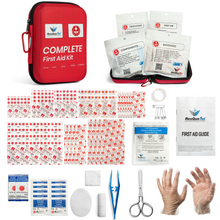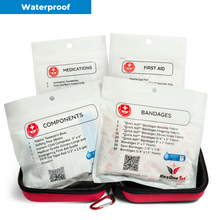
Medical professionals need an accurate medical history to be able to provide the best-possible care for you or a loved one in an emergency situation. But it can be difficult to recall all important medical information in the stress of the moment. Or maybe the emergency happens to your child when she is away from home and you are not on hand to provide the information. Or you arrive at the hospital unconscious and can’t give the information.
Having an up-to-date medical history aids the medical professionals in two very important ways: first, it alerts them to medications they should avoid and, second, it saves the need for performing tests which may delay important treatments.
Be prepared by creating an emergency health record for everyone in your family.
Information to include in an emergency health record
According to mayoclinic.org, the following information should be included in your emergency health record:
- Your name, age and sex
- Your address
- Your medication names, doses and schedules
- Your medical equipment
- Your chronic medical conditions, such as epilepsy
- Medical consent form
- Aspects of your health history that could be helpful to emergency medical responders, including allergies and immunization record
- Phone numbers for professional emergency contacts, such as your family doctor, local emergency services, emergency road service providers, and the regional poison control center
- Phone numbers for a personal emergency contact, such as a friend or family member who you’ve asked to serve in this role
You can also provide health insurance information and personal wishes with regards to end-of-life decisions.
Where to store an emergency health record
- In print. Keep a one-page-summary or a medical information card in your wallet or purse. Even older children and teens can carry a copy in their backpacks or wallets. Ensure that all caregivers have a copy of this form. For extra measure, keep a copy in any emergency kits you keep in your home, car, boat, camper, etc.
- Portable digital devices such as a cell phone, thumb drive or other device you carry.
- Online. There are many online apps and services that allow you to store personal health information online. Research which tool fits your needs. Just be sure that the information can be easily accessed in an emergency or when you are unconscious.
Accurate, up-to-date medical information is critical to have to hand in an emergency. But it is also a good idea to keep a full medical history including a running record of all of your medical procedures and medications, family history of illness, etc. stored either as a paper file or online. That way you have the information readily available when going to see a new doctor. Putting together the emergency health record and the full personal health record can take some time. But it will give you peace of mind knowing that your vital medical data is readily available when needed.








